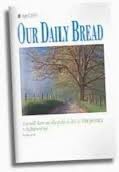Eighty-five years ago Karl Barth told his theology students to take their bibles and their newspapers, and read both; adding, “But interpret newspapers from your Bible.”(1) There are so many times when, reading or watching the news, I am grateful for the sighing and crying of the prophets. Isaiah’s ancient plea is among the most-repeated, as I sigh between heart-breaking headlines and breaking news. “O that you would tear open the heavens and come down, that the mountains would quake at your presence!” (Isaiah 64:1).
In the thick of stories that recount violence and injustice near and far, Isaiah’s prayer is a response for the speechless, the weary, and the frustrated. How long, O Lord? Where are you in the midst of this? Why is slavery still happening right under our noses in Atlanta? Why is sex-trafficking thriving in Moscow? How is it that poverty and addiction, racism and genocide are ignored, even as we obsess over trending gossip or social media witch hunts? For the church, the words of the prophets become a gift. How long, O Lord, are we going to be reading and seeing and tolerating such disparaging news? O that you would tear open the heavens and come down, that the mountains would quake at your presence.
Isaiah words articulate the cries for relief and justice within his world and within ours. But Isaiah does not merely cry out at God’s seeming absence and a longing for God to fix all he sees; Isaiah is not merely pointing a finger and waiting for God to act. And holding the prophet’s words in one hand with our newspaper in the other, we, too, hopefully see the significance for both hands. Isaiah cries both for God and the generation of people who have turned from God. The entire chapter is a fervent prayer for a change in the direction that Jerusalem is currently moving—for God’s intervention and forgiveness, for Jerusalem’s repentance and reversal.
“We have all become like one who is unclean,
and all our righteous deeds are like a filthy cloth.
We all fade like a leaf,
and our iniquities, like the wind, take us away.
There is no one who calls on your name,
or attempts to take hold of you;
for you have hidden your face from us,
and have delivered us into the hand of our iniquity” (64:6-7).
It is unavoidable when looking at injustice—even weeping over injustice—to cry foul at the other team, the other group, the other side. There are also times when looking at injustice that we would put God Himself in the dock, interrogating the one we deem distant and responsible as injustice carries on unhindered. Yet in this incessant finger-pointing, however justifiable it might seem, we fail to see the unjust things we do ourselves, our own inconsistencies, our own ironic ways of persecuting—indeed, our own ways of contributing to the very things we lament. The ancient cry of Isaiah is one that is rightfully weighted with both an awareness of the injustice around him and admittance of his and his people’s own depravity, of their own guilt. Reading the prophet’s words with our daily newspaper in hand, we might well see the importance of adding to our cries for injustice across the world, the lament over our own involvement—and the will to turn this, too, around.
For Isaiah puts before us the hopeful image of a God who would tear open the heavens to come down regardless of a people who continue to run from Him. Here in the midst of seeming impasse he utters an empowering word for God and for humanity:
“Do not be exceedingly angry, O LORD,
and do not remember our iniquity forever.
But consider now: we are all your people” (64:8).
If the entirety of chapter 64 is a fervent prayer for a change in direction, the climax of the prayer comes in this verse. The word of utmost importance, which comes as a transition to both the cry for God’s nearness and the admission of living far off, is a Hebrew word that is translated “And now.” The word is meant to be a reminder to all, a commentary on time itself. Now we can continue to fear the future, continue to live in the sin of our past, or we can stand before God today and live as clay in the Potter’s good hand. Now we can consider and reclaim that we are all God’s people. Isaiah wants us to see the God who exists in this very present space, the God who has been present and active throughout all of time, and is here even now—the God who hates injustice so much that he would come down and endure it himself.
It is no coincidence that Martin Luther King Jr. spoke often of “the fierce urgency of now.” “Now is the time to rise from the dark and desolate valley of segregation to the sunlit path of racial justice,” he said. “Now is the time to lift our nation from the quicksand of racial injustice to the solid rock of brother and sisterhood. Now is the time to make justice a reality for all of God’s children.”(2) King’s cries in the midst of his own newspaper headlines were indelibly shaped by the Bible in his other hand.
For indeed, Isaiah’s vision of a world that revolves around the kingship of God at the center of all things is a vision that pivots on the urgency of the present moment, shaped not by nostalgia for what once was, but remembrance for who God was, and is, and ever will be. Again and again, God stirs us back to the urgency of the space and time before us. Again and again, the cross reminds us of the fierce urgency of now within a world in need not of more pointing fingers and dividing speeches, but of people willing to rise and work as if now we are all God’s people.
Jill Carattini is managing editor of A Slice of Infinity at Ravi Zacharias International Ministries in Atlanta, Georgia.
(1) “Barth in Retirement,” Time Magazine, May 31, 1963.
(2) James Washington, Ed., A Testament of Hope: The Essential Writings and Speeches of Martin Luther King Jr.(New York: HarperCollins, 1986), 218.












